Africa-Press – Liberia. In a compelling address marking the 62nd anniversary of African Liberation Day, Amos Tweah, Managing Director of the Liberia Petroleum Refining Company (LPRC), emphasized that Africa’s greatest struggle today is not for political independence, but for the liberation of the African mind.
Speaking at the United Methodist University (UMU) in Monrovia, where students and faculty gathered to commemorate the continent’s historic journey from colonial rule to self-governance, Mr. Tweah described the event as “a great honor” and an opportunity to reflect on the unfinished business of Africa’s liberation.
“The liberation struggle, which dates back as far as 1958, was born out of resistance to the exploitation of African resources and the imposition of apartheid regimes aimed at suppressing the potential of African nations,” Tweah said. “But even though Africa is politically independent, we are still battling the chains that bind our minds.”
He revisited Africa’s anti-colonial history, citing the historic 1958 conference in Ghana led by Dr. Kwame Nkrumah, with Liberia, Libya, Sudan, Somalia, and others as early advocates for a free and united Africa. This movement led to the formation of the Organization of African Unity (OAU) in 1963, today known as the African Union (AU), with Liberia playing a crucial role in that formation during a pivotal meeting in Sanniquellie.
But Mr. Tweah argued that the dream of a fully liberated Africa remains incomplete. “The objective of achieving independence has been met, but the real struggle now is for mental liberation how Africans see themselves, their leadership, and their ability to transform raw resources into value right here on the continent,” he said.
Challenging Africa’s youth, particularly university students, Tweah called for greater civic engagement and accountability in governance. “Government is not a distant institution. It is your business. When the government fails, the citizens fail. When it succeeds, we all succeed,” he declared.
He warned against relying on foreign concessions and aid, urging a shift toward self-reliance and leadership that empowers African economies and minds. “Too many of us are waiting for help from overseas while ignoring the opportunities right in our hands,” he cautioned.
The program also featured stirring presentations from students and lecturers on Pan-Africanism and the historical roots of Africa’s oppression.
Patrick H. Dowonwoah., a student from UMU’s History 201 Section 2 class, delivered a passionate speech on the Trans-Atlantic Slave Trade, describing it as a “scar etched onto the soul of Africa.”
“The enslaved were not commodities. They were poets, leaders, artisans, and visionaries. Yet Europe and America built empires on their backs,” he lamented, noting that the global economic benefits gained by Western nations came at the cost of Africa’s social disintegration and resource depletion.
UMU lecturer Emmanuel W. Kofa, who teaches history, political science, and social science, provided academic context to the celebration, noting that African Liberation Day now symbolizes more than the fight for independence.
“We are celebrating Africa not because of independence, but because it is about liberating our minds,” said Kofa. “Our goal is to implant in students the importance of being African and their role in shaping Africa’s future.”
He commended the interdisciplinary participation of students from both history and political science, emphasizing that African systems of governance and resistance predate Western models and deserve deeper scholarly exploration.
In closing, the day’s events served as both a commemoration and a call to action. The recurring message was clear: political independence was merely the first chapter. The current battlefront lies in redefining African identity, governance, and economic agency.
As Mr. Tweah aptly stated, “If we are not liberated in our minds, we will always feel inferior to those who come under the banner of concession companies. True liberation starts within.”
The event underscored a growing consensus among educators, students, and thought leaders: Africa’s future lies not just in remembering the past, but in transforming that legacy into modern empowerment through education, leadership, and collective responsibility.
For More News And Analysis About Liberia Follow Africa-Press






